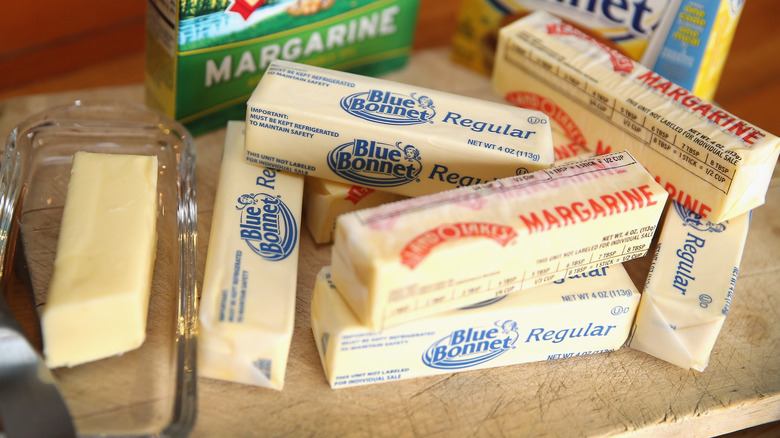The Truth About What's Really In Margarine
Margarine has emerged as a healthier alternative to butter, making its way into desserts, crackers, bread, and sauces. Its history goes back to the 1860s, when French chemist Hippolyte Mège-Mouriez created a spread that was cheaper and longer-lasting than butter. Today, this food product is about 80% fat by weight and has little in common with its original version (per Food Emulsifiers and Their Applications).
Butter is made from cream, which packs large amounts of saturated fat. Depending on the brand, it has around 200 calories and 23 grams of fat — including 14 grams of saturated fat — per ounce, according to My Food Data. Like all animal products, it also contains dietary cholesterol. Margarine has a similar nutritional value, but it's made from plant-based ingredients. Therefore, it's lower in saturated fat than butter and has no cholesterol. But this doesn't automatically mean it's good for your heart and arteries.
The saturated fat in butter can skyrocket your cholesterol levels and contribute to heart disease, warns cardiology dietitian Julia Zumpano, RD, LD (via the Cleveland Clinic). Margarine is supposed to be healthier, but that's not always the case. This processed food may contain trans fat, which is a lot worse than saturated fat.
What is margarine made of?
Most types of margarine are made from refined vegetable oils such as soybean or palm oil and processed through hydrogenation. This chemical process allows manufacturers to convert vegetable oils from liquid to solid, explains Providence Health & Services. But hydrogenation also creates trans fat, a compound that raises bad cholesterol and lowers good cholesterol levels. Butter, by comparison, is less processed and contains naturally occurring trans fats.
Harvard Medical School states that trans fat is the worst type of dietary fat. It contains nothing but empty calories and has no health benefits. In addition to its harmful effects on blood lipids, it promotes inflammation and insulin resistance. As the researchers note, "for every 2% of calories from trans fat consumed daily, the risk of heart disease rises by 23%." On top of that, hydrogenated trans fats pose greater health risks than naturally occurring trans fat, notes Providence Health & Services.
Margarine may also contain additives, preservatives, and other potentially harmful chemicals. Additionally, this highly processed food is lower in calcium, potassium, phosphorus, and choline than butter, reports My Food Data. Although it provides higher amounts of vitamin A, its risks outweigh any potential benefits. To stay on the safe side, consider using olive, canola, or sunflower oil instead of butter and margarine, suggests Providence Health & Services. Another option is to opt for soft or liquid margarine, which tends to be lower in trans fat.


